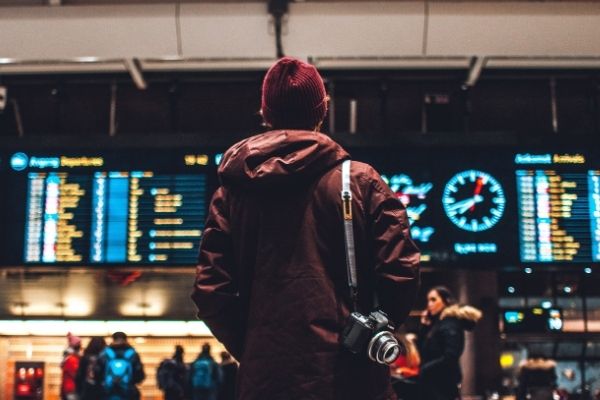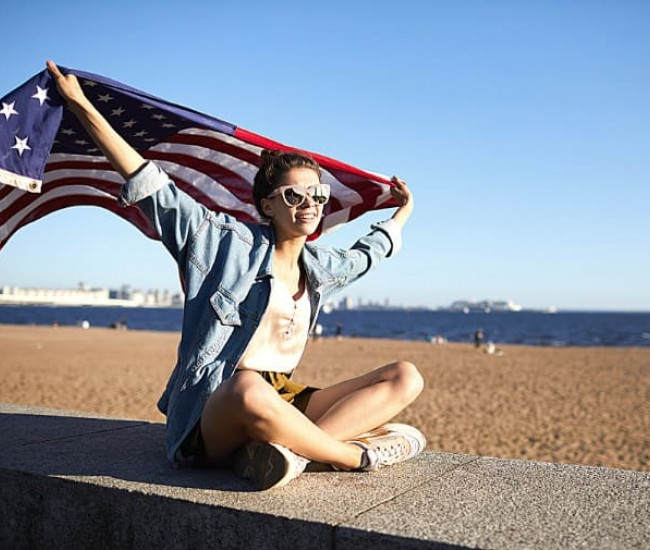- Entry to the USA
- Visitor visa
Visitor visa for the USA
If you would like to travel to the USA but do not qualify for ESTA, you will need a US visa. Learn about the specifics of B-1 and B-2 visas and get essential tips on how to apply for a visa and enter the United States.
- When do I need to apply for a B-visa?
- The difference between B-visa and ESTA
- Requirements for a United States B-visa
- How long are B-1 and B-2 visas valid?
- How to apply for a B-visa
- What happens in the US visa interview?
- Wait times for B-1 and B-2 visas
- Working in the USA despite a visitor visa
- Convert a B-1 or B-2 visa to a Green Card
- How often may I enter the USA on a B-1 or B-2 visa?
- How long can I stay in the USA without a visa?
- Can I stay in the USA as a retiree?
- Passport validity for a B-1/B-2 visa
- Passport expired: re-apply for a visa?
- Visa expires while I am in the US: What to do?
- B-visa rejected: What now?
Take the chance of living in the USA and apply for the official US Green Card Lottery!
When do I need to apply for a B-visa?
Travelers to the USA who do not qualify for visa-free entry with an ESTA travel authorization due to their citizenship, the purpose of stay, length of stay in the USA, or for other reasons must apply for a US visa for entering the United States.
Among the most popular visa categories for travel to the US are the so-called B-visas. These are:
| Category | Purpose |
|---|---|
| B-1 | Business travel (e.g., for meetings, conferences, trade fairs, contract negotiations) |
| B-2 | Private and tourist purposes (e.g., vacation travel, family visits, medical treatment, events) |
B-visas belong to the non-immigrant visa category and are, therefore, limited to a fixed duration of stay.
Note that B-1 and B-2 visas do not include work authorization. As a consequence, only limited, non-productive business activities are allowed for B-1 visa holders, and attendance at events on a B-2 visa must be of a private nature.
Tip
With a Green Card, you automatically get a permanent work permit for the USA.
The difference between B-visa and ESTA
With both B-visas and ESTA travel authorizations, only private or limited business visits to the USA are allowed. However, an ESTA is not a visa. Major differences are:
| Travel Authorization | B-visa | ESTA |
|---|---|---|
| Duration of stay | 180 days | 90 days |
| Application time | Several hours | Approx. 5 minutes |
| Waiting time for approval | Several days to weeks | Max. 72 hours |
| Is an interview appointment necessary? | Yes | No |
| Costs | $ 185 | starts from approx. € 50 (with additional securities and services) |
US visa fees are non-refundable and non-transferable even in the event of a refusal. A money-back guarantee is only available when applying for ESTA via the ESTA-Online Services.
Requirements for a United States B-visa
To get a B-1 or B-2 visa approved, you must meet the following requirements:
- You have a valid passport
- You plan to stay in the US for less than 180 days
- You do not plan to work in the USA
- You do not intend to immigrate to the USA
- You have a permanent residence in your home country
Tip
If you are considering immigrating to the USA, we recommend participating in the Green Card Lottery. Possession of a Green Card frees you from any time restrictions and recurring application procedures for residence permits in the USA.
How long are B-1 and B-2 visas valid?
With a B-1 or B-2 visa, you may stay in the USA for up to 180 days at a time. However, the visa itself is generally valid for ten years. This means that within ten years, you can enter the country repeatedly for 180 days.
However, make sure that the periods between your entries are not too short. Otherwise, the US authorities may suspect an immigration intent.

With a B-visa, you can enter the USA repeatedly for 180 days within a 10-year period.
How to apply for a B-visa
To apply for the B-1 or B-2 visa, you can contact your local US embassy or consulate via the official technical visa service provider and go through the following steps:
- Complete the "Online Nonimmigrant Visa Application" (Form DS-160)
- Pay the visa fee
- Schedule and attend a visa interview
- Receive your visa
If you need assistance with your B-visa application, our US Visa Service will be happy to help.
What happens in the US visa interview?
In the visa interview at your local US embassy or consulate, you will need to back up the information you gave in the "Online Nonimmigrant Visa Application" (Form DS-160). For this purpose, take the following documents with you:
- The confirmation page of the DS-160 form
- A valid biometric passport
- A recent passport photo
- Confirmation of your visa fee payment
- The appointment confirmation from the US consulate or embassy
- Evidence of your strong professional and personal ties to your home country
- Evidence of the specific purpose of your stay (e.g., tourist travel plans, invitations for business trips, etc.)
At the end of your interview, the embassy or consulate staff will inform you whether your visa will be approved. If approved, your passport will be retained for further processing and sent to you by mail after approximately one week.
Wait times for B-1 and B-2 visas
The time frame in which your B-visa application is processed depends on a number of factors, including how carefully you have filled out the forms and the time of year. During peak travel seasons (summer and winter), there can be wait times of up to four weeks. In the off-season, you should expect a processing time of about 2-3 weeks.
Important
Please note that average processing times may be affected by exceptional situations and crises. We will always inform you about current developments in our The American Dream Newsletter.
Working in the USA despite a visitor visa
Under certain circumstances, you may be able to change your visa status from a B-1 or B-2 visa to another visa category, such as H-1B for highly skilled workers or O-1 for persons of exceptional ability.
If you get an unexpected offer during a visit and would need to stay in the country directly to start work, you might start a "change of status" process for this.
The problem is that the visa categories in question require complex procedural steps and have longer processing times. So it takes plenty of skill on the part of the sponsor (i.e., the prospective US employer) and a good amount of patience to change the visa status from visitor to a US work visa.
It is best not to attempt this without a competent visa consultant.
Convert a B-1 or B-2 visa to a Green Card
More reliable than the complicated application for a temporary work permit is applying for a Green Card. As a B visa holder, you can do this if:
- a US employer sponsors your application for a Green Card through the workplace
- you marry a US citizen
- you win the Green Card Lottery
- you are a lawful asylum seeker
- you have a US citizen as a parent
Given these choices, winning the Green Card Lottery is the best and fastest way for most people to immigrate to the United States in a timely manner.
How often may I enter the USA on a B-1 or B-2 visa?
Within the ten-year validity period, you may enter the US on a B-1 or B-2 visa as often as you wish and stay there for a maximum of 180 days at a time.
However, keep in mind that even the slightest suspicion of immigration intent can get you into trouble with the US authorities. Therefore, you should use your freedom to travel as sparingly as possible within the ten years of validity.
How long can I stay in the USA without a visa?
You can enter the United States without a visa using ESTA, provided you meet the ESTA requirements regarding your country of origin, your travel intentions, and the planned length of your stay.
If you qualify for an ESTA, you may travel to the United States as often as you wish for a maximum of 90 days at a time within the two-year validity period.
Can I stay in the USA as a retiree?
Staying in the United States as a retiree on a B-2 visa is possible but not a pleasant solution. This is because you will have to leave the country regularly for a longer period of time, even in your old age, in order not to be considered an illegal immigrant.
Therefore, our urgent recommendation is: enter the Green Card Lottery and get an unlimited residence permit for the USA!
Passport validity for a B-1/B-2 visa
The mandatory validity period of the biometric passport for travel to the USA distinguishes between two types of travelers:
| Travelers ... | Minimum passport validity |
|---|---|
| … from countries of the "Six-Month-Club" | Until the end of the US trip |
| … from other countries | 6 months after the end of the US trip |
The so-called "Six-Month Club" exempts travelers from specific countries from the normally applicable 6-month passport rule. The list of countries participating in the "Six-Month Club" is updated regularly on the U.S. Customs and Border Protection website.
Passport expired: re-apply for a visa?
If your B-1 or B-2 visa is still valid, but your passport has expired, there's no need to apply for a new visa. When traveling, take both the old and your new valid passport with you.
However, keep in mind that your name and other personal information must match. Therefore, if you change your name or other personal information, you would also need to apply for a new visa.
Visa expires while I am in the US: What to do?
If the ten-year validity of your visa expires while you are in the United States, the entry stamp in your passport and/or the indicated date of departure in the digital I-94 form will be decisive.
The date determines the period of your legal stay in the USA. Therefore, it is advisable to briefly check both the stamp and the electronic form each time you enter the country and, if necessary, have them corrected directly at the border.
Tip
You can travel to the USA until the last day of validity of your ten-year B-1 and B-2 visas. However, you are also allowed to apply for a new visa during the validity period.
B-visa rejected: What now?
If your application for a B-1 or B-2 visa has been denied by the US government, there can be several reasons. These include incomplete documentation, incorrect information, an unsuitable category selection, missing prerequisites, or suspicious behavior leading to suspicion of an immigration intent.
After a rejection, you will most often have the opportunity to correct your mistakes or submit missing documentation. However, with serious reasons for rejection, even a reapplication is unlikely to help you.
Ask nicely for the rejection reasons, and if you are unable to find out (U.S. officials are not required to tell you the reason for their decision), seek advice from a visa expert before filing a new application to avoid the risk of an entry ban.


 DE
DE EN
EN ES
ES FR
FR IT
IT PL
PL TR
TR UA
UA